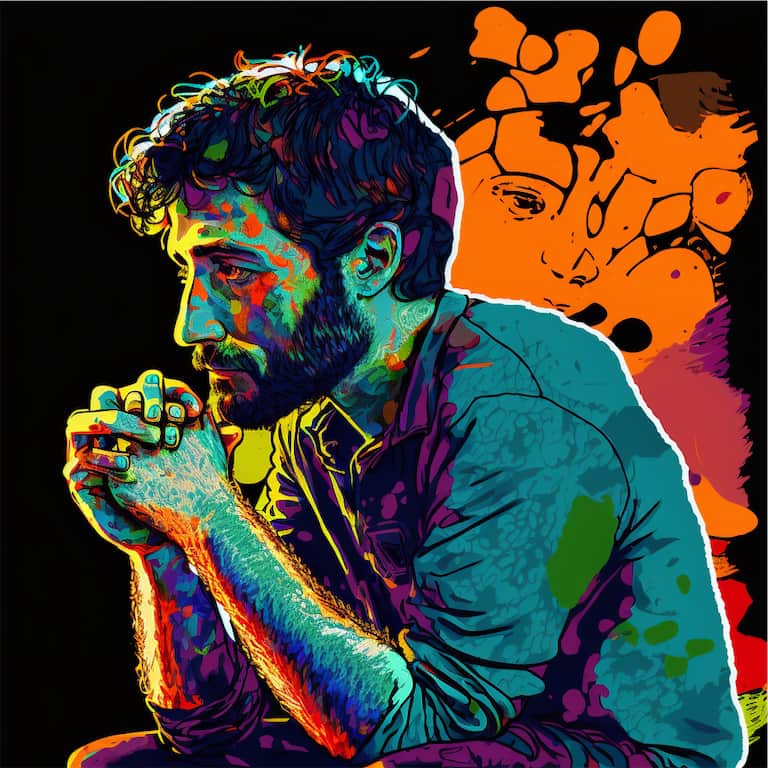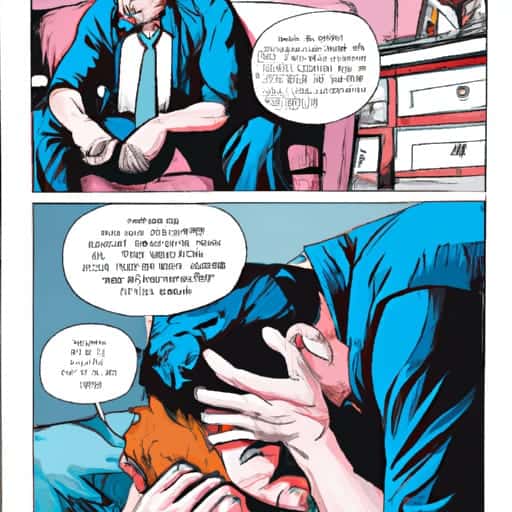
How To Explain Anxiety To Someone
Introduction
It’s Not A Choice to Feel Anxiety
When you come to describe anxiety to someone, you should say that anxiety disorders are recognized mental health conditions.
Yes, everyone has occasional anxiety and anxious thoughts, but an anxiety disorder is not a temporary worry caused by a stressful situation, it is an established medical condition.
The American Psychiatric Association set outs the following anxiety diagnoses:
- Specific Phobia.
- Social Anxiety Disorder
- Panic Disorder
- Agoraphobia – (1-2.9% of young adults have this)
- Generalised Anxiety Disorder.
- Separation Anxiety Disorder
How To Explain The Anxiety Iceberg
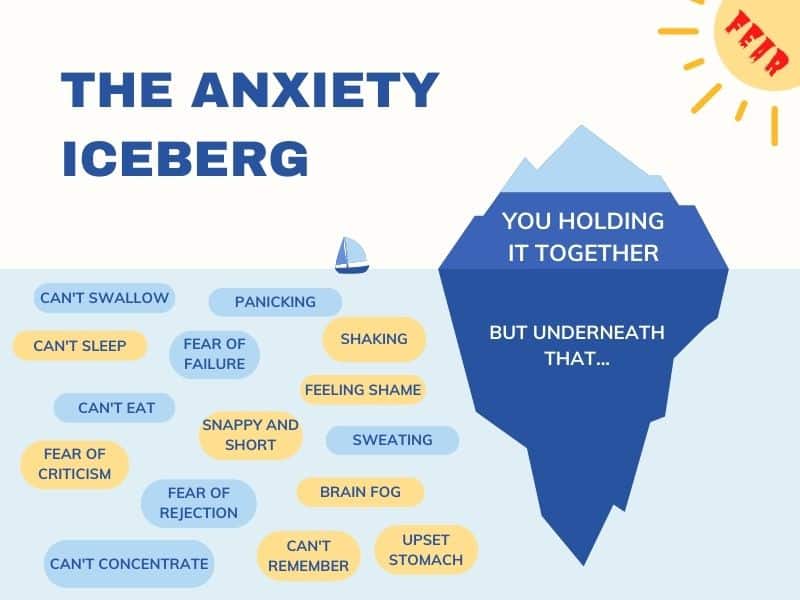
Anxiety is the most common mental health condition. It is difficult to explain anxiety to someone else. You fear you are falling apart, and they can’t see what’s going on inside you. But you think they must have noticed you behaving weird. Maybe they think you’re cracking up or are just plain weird.
If they’re kind, they might be puzzled trying to work it out. They might be family members or a trusted friend.
They might be bosses, teachers, or managers.
You’ve heard all these before:
Why can’t you get on with your schoolwork? You know it’s got to be done — why don’t you just do it?
Why did you take those days off work? After all, you look fine to me. You’re not really sick. Just get on with it.
Why can’t you come out? You know how important this occasion is to (fill in the name here)? You’re just being selfish.
It can be truly hard to explain your anxiety feelings to get someone to understand how you feel.
You will probably be torn between telling people in case they notice you acting weird, hiding it, hoping they won’t notice all.
My Own Anxiety and My Current Experience
I have had an anxiety problem. I don’t have one now. Sure, I get flashes of it in stressful situations, but I would say that in day-to-day life, apart from one specific phobia, I’m cured of my anxiety.
I am a mental health nurse working in a busy doctors’ surgery. I see patients with many mental health conditions.
It is very common for people to come into my surgery with anxiety. Every day, I might see ten or even twenty people with anxiety problems.
They tell me:
- They feel so bad they think they’re going to die.
- It’s real, it’s actual, and they’re not making it up.
- They don’t know how to stop it.
- They feel ashamed that they can’t ‘pull themselves together’ like everyone says they should.
But if you could just ‘snap out of it’, you would. Of course you would.
But you can’t.
There is treatment available, and you should seek that, but in the meantime, it would be really helpful if those around you could begin to understand how you feel.
But you just don’t know how to explain anxiety to someone who has never had anxiety. Let’s have a look at that.
When People Do Finally Understand Anxiety
Some of my patients coming into office will tell me they did not understand anxiety before—that they had little sympathy until they themselves begin to suffer from its bone-crushing, nerve-numbing effects.
Then they say:
I used to think anxiety was made up, but now I’ve got it and I finally know how bad it is.
Managers will say,
‘I used to give my employees a hard time. I thought they were just making excuses because they were lazy or incompetent. But now I’m suffering from the same thing. I know exactly what they were going through, and I wish I hadn’t given them such a hard time of it.’
How Anxiety Feels
Your anxiety might get so bad sometimes that you can’t go out of your house.
There are places you avoid.
Supermarkets and buses are terrible for you. When you are in such a place, you think everybody notices how weird you look. Maybe they are whispering to each other about you. Maybe they are just thinking about what a freak you are.
Even if you hide your anxiety, you don’t want to talk to people about it because their eyes glaze over.
They start off being sympathetic but then want to talk about something else. They simply don’t understand why you can’t do certain things.
Anxiety is a Big Problem
More than 18% of people in the United States have anxiety disorders. About 40 million Americans suffer every year. Only 37% of those who are sick get any kind of help.
At any given time, more than 8 million people in the UK have an anxiety disorder.
In the spring of 2021, 25% of 18-year-old and older Canadians had symptoms of depression, anxiety, or posttraumatic stress disorder (PTSD). This was up from 21% in the fall of 2020.
Over half of Australians between the ages of 16 and 85 (43.7 percent, or 8.6 million people) have had a mental disorder at some point in their lives.
15% of Irish people in the Healthy Ireland Study of 2021 meet the criteria for a diagnosis for an anxiety disorder.
About one in four people in New Zealand will have an anxiety disorder at some point in their lives. 15% of the people will be affected at any given time.
So we see that anxiety is massively prevalent. Most people will have one bout of anxiety in their lives. It is a major problem, but it is cloaked with stigma — something you don’t speak about.
People who’ve never yet had anxiety can be split into two groups:
- The potentially helpful, who don’t understand anxiety because they know little about it, but who would be supportive if you could explain anxiety to them.
- The potentially hostile, who have already made their minds up that anxiety is just something people make up when they don’t want to do something.
There’s even hope for this group. If you give them the key information on anxiety; that it’s a documented and properly diagnosed mental health illness, and show them how they can support you to get the things they want to be done completed, then even most of the potentially hostile can be converted into allies, or at least not enemies.
Anxiety Statistics
Anxiety Disorders In The USA
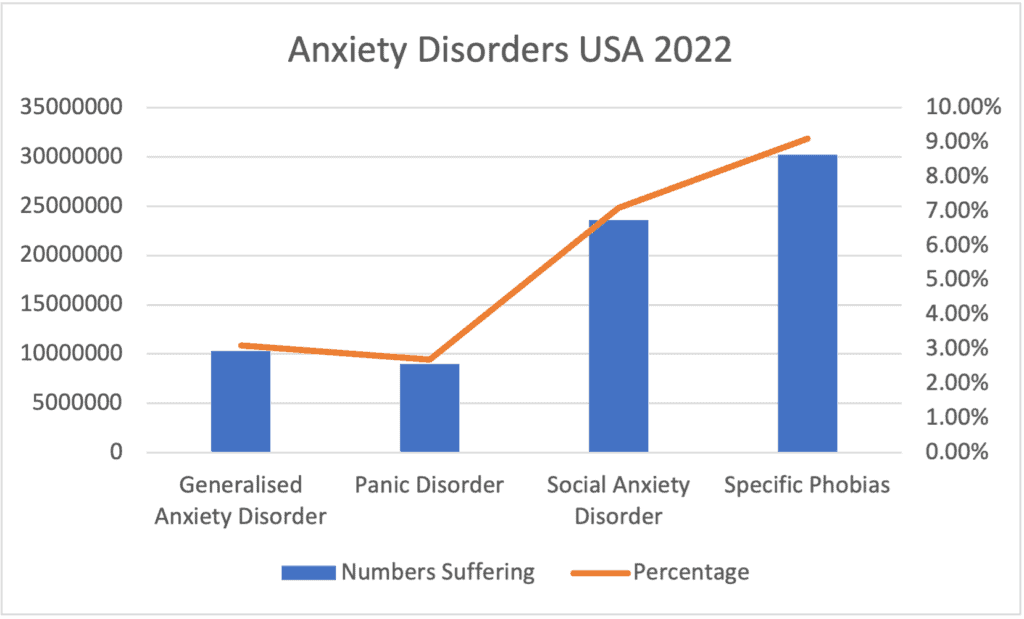
| Anxiety Disorder Name | Numbers Affected | % of Population |
|---|---|---|
| Panic Disorder | 8974899 | 2.70% |
| Social Anxiety Disorder | 23600659 | 7.10% |
| Specific Phobias | 30248732 | 9.10% |
| Generalised Anxiety Disorder | 10304513 | 3.10% |

How to Describe Anxiety?
Types of Anxiety Disorders
You may know what your specific anxiety diagnosis is, or you may not. For ease, I will briefly explain the different types of anxiety.
Generalised Anxiety
Generalized anxiety disorder, or GAD, is characterised by a huge amount of worry and anxiety about everyday things that doesn’t appear to have a cause. People with generalised anxiety disorder frequently expect bad things to happen all the time and can’t stop worrying about their health, or school, or money, or family or work.
Worry, fear, and dread are always present in daily life, but for people with GAD, it’s much stronger.
It’s even possible that anxiety can take over a person’s thoughts to the point where it’s hard for them to do normal things at work or school, with friends, and in their relationships.
Panic Disorder
Panic disorder is an anxiety disorder in which you often feel intense panic or fear all of a sudden.
The flight response is activated and the feelings of anxiety can be so intense that in the worst case scenario, sufferers end up in emergency rooms, most often to be sent away.
You might avoid certain situations because you’re afraid they’ll bring on another panic attack.
During panic attacks, you feel a rush of intense mental and physical symptoms.
It can happen quickly and seemingly for no reason.
A panic attack is always terrifying and unnerving.
Panic attacks are an overwhelming need to escape and get away
They feel like way too much to manage and control.
A person having a panic attack might feel like they’re having a heart attack or an asthma attack, or they might feel like they’re losing control.
You can have panic attacks without without Generalised Anxiety Disorder. You can feel fine most of the time then a panic attack comes apparently out of the blue. Or you be anxious all the time and have panic attacks on top of the GAD.
Social Anxiety Disorder
Social anxiety disorder is a type of anxiety disorder that many people have. It is also called social phobia and happens in social situations. A person with social anxiety disorder feels anxious or afraid whenever they are watched, judged, or evaluated by others, such as when they have to speak in public, meet new people, date, go on a job interview, answer a question in class, or talk to a cashier in a store. Everyday things, like eating or drinking in front of other people or going to the bathroom in a public place, can also give people anxiety or fear because they worry about being embarrassed, judged, or rejected.
These difficult situations can provoke an anxiety attack.
This fear can make it hard to work, go to school, and do other everyday things. Even making and keeping friends can be hard.
Social events are avoided as the amount of anxiety they provoke is too great.
Social Anxiety is most prevalent in young people between the ages of 15 and 25.
Specific Phobias
A specific phobia might include ‘trapped’ situations like flying, being in a small room, or going to school classroom
Extreme natural phenomena like storms or high places
Animals or bugs, such as dogs or spiders
Blood, needles, injuries, or medical procedures, such as accidents or medical procedures,
Others, like choking, throwing up, loud noises, or clowns, can cause extreme terror.
Obsessive Compulsive Disorder
The two main parts of obsessive-compulsive disorder (OCD) are obsessions and compulsions.
Obsessions are unwanted thoughts, images, urges, worries, or doubts that keep coming back to you repeatedly. They can give you a lot of anxiety, though some people call it “mental discomfort” instead of anxiety.
Compulsions are things you do repeatedly to ease the anxiety that your obsession causes. It could be things like making sure a door is locked over and over, repeating a certain phrase in your head, or feeling your body.
Separation Anxiety
Separation anxiety disorder includes anxious feelings about leaving home or loved ones or being away from them. Constant, excessive worry about losing a parent or other loved one to illness or a disaster. Constant fear that something bad will happen, like getting lost or being taken away, causing them to be separated from their parents or other loved ones. This is not a normal part of life.
Post Traumatic Stress Disorder
Post-traumatic stress disorder (PTSD) is a mental illness that can affect people who have been through or seen a traumatic event like a natural disaster, a serious accident, a terrorist act, war/combat, or rape, or who have been threatened with death, sexual violence, or serious injury. It creates intense anxiety when memories related to this are triggered.
The Physical Symptoms of Anxiety
- Physical feelings like a churning feeling in your stomach
- feeling light-headed or dizzy
- pins and needles
- feeling restless or unable to sit still,
- headaches,
- backaches, or other aches and pains
- faster breathing
- chest pain
- a fast, thumping, or irregular heartbeat
- sweating or having a hot flush
- sleep problems
- You grind your teeth, especially at night.
- You feel sick
- You go to bathroom more or less often.
- You’re not interested in sex.
- feeling tense or having aches (especially neck, shoulders and back)
- sweating or feeling dizzy
- shaking
- ‘butterflies’ or feeling sick in the stomach.
- Low energy levels
The Emotional and Mental Symptoms of Anxiety
- feeling tense, nervous, or unable to relax
- having a sense of dread or fearing the worst
- feeling like the world is speeding up or slowing down
- feeling like other people can see you’re anxious and are looking at you
- feeling like you can’t stop worrying or that bad things will happen if you stop worrying about anxiety itself,
- like worrying about when panic attacks might happen
- wanting a lot of reassurance from other people or
- worrying that people are angry with you
- sad feelings and depression
- rumination is when you think a lot about bad things or go over a situation repeatedly.
- Depersonalization when you feel disconnected from your mind or body, or like you are a character in a movie.
- Derealization when you feel like the world isn’t real.
- persistent worrying and excessive fears
- being unable to control the worries
- being unable to relax
- avoiding challenging situations
- being socially isolated or withdrawn
- having trouble concentrating and paying attention
- feeling annoyed, irritated or restless
- poor sleep
- problems with work, social or family life
- panic attacks.
- You may even have suicidal thoughts.
How Does Anxiety Work?
It used to be said that mental disorders were caused by a chemical imbalance in the brain. The common belief now is that anxiety is caused by environmental factors, stressful situations and that anxiety issues are, in part, genetic.
Triggers Trigger
We go through the world, and the world is full of triggers. Certain objects, thoughts, sensations and, places are linked to a web of memories and feelings in our minds.
Triggers trigger whether or not we notice them.
Most of the times triggers are helpful, or at least not harmful. They remind us to go to work, buy food, get Christmas cards and a jingle might remind us of a certain TV show.
That’s all fine. But what if your underlying stress level is high? How do triggers work then?
Think of life like a big glass jug and stress is the water inside it.
Different things in life put water (stress) into the jug — your genes, what’s going on in the world around you, your relationships, your lack of money, physical health, arguments, workload, and then the water flows over the top of the jug and you get anxiety symptoms
You might have so much water in your jug that it’s flowing over all the time. We call that Generalised Anxiety Disorder.
Sometimes, you are okay most of the time, but then something triggers, and the water pours over the top of the jug, causing a panic attack.
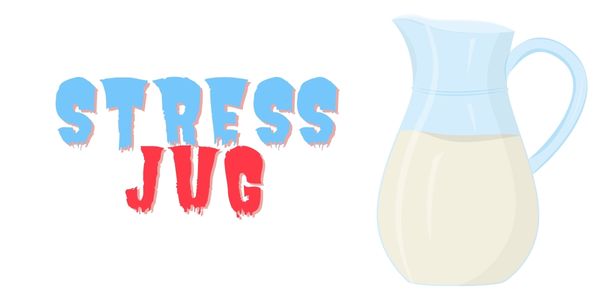
Sometimes panic attacks are triggered by smells, or sounds that you have hardly noticed.
Each person has their own unique triggers, depending on their life experiences.
Sometimes anxiety is triggered by memories and associations you’re not really aware of. These thoughts are just going on like a river beneath your attention.
You don’t know what triggered the panic attack until it comes devouring to get you.
For people with health anxiety, health worries can be caused by the mind noticing that the heart is beating faster, or there’s an odd sensation of tension and it starts to flash a red alert that we suddenly become aware of, and panic.
Thoughts Appear
Your thoughts are triggered by you noticing things either inside your mind (thoughts and emotions) and body (feelings or sensations)
You do not choose the thoughts that the triggers produce. They arise from them without you doing anything.
If it was true that you manufactured your anxiety, then it would be your fault? Not only that, if you started it, then you could stop it.
But you can’t stop your anxiety so easily, can you?
I repeat — you do not choose your thoughts. Think about it: what are you going to think in an hour’s time? Five minutes? The next thirty seconds?
You don’t know, because you don’t choose your thoughts.
Again, thoughts are triggered into existence either from an outside event, like seeing a object, entering a room, smelling tobacco, or from an internal event like a memory or physical feeling.
No one chooses their thoughts, so you can’t be held responsible for your thoughts.
But your thoughts, which often come like little movies — sadly, often they are like horror movies for people with anxiety – cause emotions and feelings.
Feelings Arise
I believe a trigger causes a thought, and a thought causes a feeling.
A car veers towards you on the road, and you have the thought of a crash with all the colour, sound, pain that will cause. All this fires up in your mind, you have a feeling of anxiety and emotions of fear trigger off like firecrackers.
The scenario your mind conjures brings with it all the emotions like your own particular horror movie.
Again, you do not choose to be hungry, or fall in love, or to want to go to Italy, or have anxiety.
Feelings arise. Their arising is not under your control. It is not your fault that you feel certain things. It just happens.
Where Does Anxiety Come From?
- Traumatic Events
- Current Stress
- Genes
- Alcohol and Other Drugs
- After Dismissing Anxiety In Others, People Then Get It Themselves
No, it’s not rational. But it’s still real. And It’s Still Overwhelming.
Hope For Anxiety Sufferers
It is possible to treat anxiety, and the best treatment is different for different people. You should speak to qualified mental health professionals about the treatment plan for you. Treatment is often cognitive behavioural therapy, but there are other treatment options depending on where you live.
Therapy
Therapy is one of the three fundamental ways to treat anxiety. We are not discussing therapy in depth in this article. Experiencing therapy is the only way to know if it will work for you. For more about anxiety therapy, go here.
Anti-Anxiety Medications
We also use medications (psychopharmacology) to treat anxiety. There are different classes of prescribed drugs and some off-license and herbal medications used for anxiety. We are not discussing them in this article. All medication has side effects. Please go here to learn more about medication for anxiety.
Peer Support
You can get peer support from a family member, but it’s important to get the right treatment and serious mental illnesses need professional help.
How To Explain Anxiety: Conclusion
What do you actually say to explain anxiety to someone? That depends on the group they fall into. There are different ways of explaining depending on where they are on their own journey.
Potential Allies
Give them the figures. Let them see the prevalence.
Let them see the list of symptoms and sensations
Explain which symptoms you feel and experience
Tell them they can see now it’s not only you — it’s approximately 15% of the population of the world suffering.
Most reasonable people are going to understand and even try to help
The Prejudiced
These people know everything about anxiety, even though they know nothing.
In their own thoughts, they have already half decided you are faking or weak — even if it’s not acceptable for them to say that out loud.
It’s a much harder thing to explain anxiety to someone like this, but it can still be done.
Explain that it’s a recognised illness that affects 15% of the population and it’s on the rise.
Ask them have they, or anyone they are close to, suffered from anxiety?
Do they know anyone who has worried about losing their job, or having a relative get ill, or about having to pay a bill or do an exam or have surgery?
Do they know anyone who’s had sleepless nights worrying?
Ask them if that person (it’s probably them) sat down and made a choice to worry?
They are obviously going to say ‘no’ here. They are halfway to understanding.
Then gently explain that when someone has an anxiety disorder, that worry never stops. It goes on all the time and there is no choice involved in it.
You can even attempt humour and ask them if they want to swap feelings for a day? They can be anxious and you can be okay.
If, after all this, they still show no signs of understanding, then they probably never will — until something in their life gives them anxiety, then they will know.
This kind of person isn’t going to get it, whatever you say. I wouldn’t waste your breath further at this time.
I’ve known people like this though, who, once they’ve had time to think over the points raised will start to understand.
In my experience, most people have kindness and empathy. They will see your suffering and they will eventually thaw and respond to it, if you can explain your anxiety to them..
Related Articles
Top 5 Herbs in Ayurveda for Treatment of OCD
Depression After Stopping Drinking
5 Most Effective Antidepressants for Anxiety and Depression (and 3 you should avoid)
How To Explain Anxiety To Someone
Top 5 Herbs in Ayurveda for Treatment of OCD
Links For Further Reading
https://www.anxietycentre.com/statistics/anxiety-disorder-statistics-facts/
https://www.nice.org.uk/guidance/cg113
https://mhanational.org/issues/2022/mental-health-america-adult-data
https://adaa.org/understanding-anxiety/facts-statistics
https://www.statista.com/statistics/1035155/percentage-of-people-with-anxiety-worldwide-by-gender/
https://www.mentalhealth.org.uk/explore-mental-health/statistics
https://www.psychiatry.org/patients-families/anxiety-disorders/what-are-anxiety-disorders






